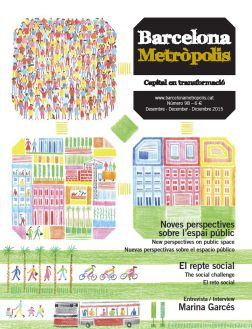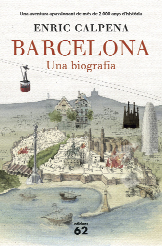Barcelona. Una biografia [Barcelona: A Biography]
Author: Enric Calpena
Edicions 62 / Destino
Barcelona, 2015
Thanks to his work promoting the history of Catalonia, the journalist Enric Calpena has become one of the most prominent names in contemporary historical literature. With works such as this, he adds to notable 20th-century initiatives such as the series by Agustí Duran i Sanpere, which was turned into a book following its success on the radio, becoming a benchmark work for educated readership.
In Barcelona. Una biografia, he succeeds in giving a voice to a city that for over 2,000 years has made ambition the main feature of its urban personality. The history of Barcelona can be explained through its documents, such as the municipal archives that resulted in the book Autobiografia de Barcelona (2013), or it can be explained through its people, institutions and stones. That is what has been done and presented to us through a story with over 800 pages, in which the journalist interviews Barcelona.
The result is an ambitious literary text that is well-documented, enjoyable to read, rich in anecdotes and always marked by Calpena’s unabashed style, a style prone to impromptu comparisons in order to decipher historical facts that are sometimes too distant and even incomprehensible for modern readers, but one that is also loving, given the author’s esteem for his home city. The Barcelona profiled by Calpena is a city with a privileged geographical position on the Catalan coast, especially since it stands between the two milestones of the ancient western Mediterranean, Empúries and Tarraco. The evolution of this urban enclave is depicted through the different names it has had throughout history, from the primitive Barkeno to Roman Barcino, which became Barsiluna in Moorish times, Barchinona in Christian times, and finally Barcelona in the late medieval and modern age. It enters modernity marked by the fire and destruction of the War of the Spanish Succession and the Peninsular War, while the final chapters focus on the adventure of contemporary Barcelona, bringing readers practically up to the present day.
The undoubted aim is not to provide an exhaustive overview, but an invitation to enjoy the amazing complexity of Barcelona through the centuries. In many cases, the author – whose work had hitherto focused on more contemporary themes – pays more attention to distant episodes of the ancient Roman or medieval city than to the 19th or particularly the 20th century. An example: the same attention is dedicated to the parliament of 1413 as to the 40 years of Franco’s dictatorship.
The result is an innovative approach that Calpena uses to broaden the horizons of Catalan history, as well as Spanish history during the more recent centuries, going beyond focusing on the history of the city as other journalisthistorians have done with great success, such as Lluís Permanyer, Jaume Fabre or the sorely missed Josep Maria Huertas Claveria. This is not a book on urban history in the strict sense, but it is a good work of historical literature on the role Barcelona has played within Catalan and Spanish history.
Barcelona is, effectively, a city that endears itself, as Calpena affirms in the prologue. The book is an act of love for the city and its past. Available in Catalan (Edicions 62) and Spanish (Destino) editions, the publishers should also consider English and French editions at the very least. The dissemination of Barcelona and its history deserves it, and its potential readers would surely appreciate it.




